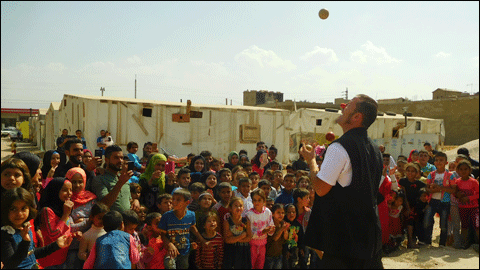Pallassos Sense Fronteres and the UTCCB return to Lebanon to visit refugee children
The Unit of Trauma, Crisis and Conflicts of the UAB and Pallassos Sense Fronteres are collaborating in a project which aims to offer emotional and psychological support to refugee children in Lebanon and evaluate the results of this initiative. A second trip is scheduled for this December.

The objective of the project is to have the largest positive effect possible using actions aimed at reducing post-traumatic stress in children who have suffered the consequences of war. At first, the project will be conducted in Lebanon, but soon will be taken to other parts of the Middle East, such as the north of Jordan or Iraqi Kurdistan, places where Pallassos Sense Fronteres for years have been developing this project.
Throughout Pallassos Sense Fronteres' history there has been a strive to make as strong an impact as possible and help their audience benefit the maximum from the happiness and joy their actions bring. That is why in 2008, with the support of the Humanitarian Action sector of the Catalan Agency for Development and Cooperation (Government of Catalonia), Pallassos Sense Fronteres began a parallel external assessment process, which completed a first methodological phase and a second immediate impact phase based on the interaction of positive emotions in resilience processes in children. The economic and social crisis which began that same year halted all activities and now the organisation has the possibility of continuing with the help of the UTCCB and the Fundació Nous Cims, a Catalonia-based foundation offering support and also fostering social projects with the capacity of producing transformations in society.
Project Objectives and Methodology
In the framework of this project and with the aim of helping Pallassos Sense Fronteres improve the impact of their actions, the UTCCB will conduct rigorous assessments of their actions by using precise methodologies and at the same time establish a link between the actions and Teaching Recovery Techniques (TRT), a method which can be applied to people affected by all types of traumas: wars, natural disasters, instability when living as a refugee, etc. These techniques aim to offer children strategies with which to identify their reactions and help control them in order to improve their emotional state and at the same time reduce the symptomatology of their stress (nightmares, flashbacks,etc.).
These practices will be included in a manual which can be later used by teachers, nurses or even family members in charge of or working with children and adolescents affected by wars or catastrophes. This aspect is crucial for the objectives of this methodology: children work with people they trust and who speak their language. It has been therefore designed to be used by people who are in constant contact with the children: teachers, educators, healthcare professionals, community leaders, but not international experts, as detailed in the international recommendations on psychosocial interventions. The method has been in use and evaluation since 1999 in countries like Greece, Turkey, Iran, China and Sri Lanka.
Children and adolescents are not only the most vulnerable members of the population exposed to war, natural disasters and other crises, they also represent the future of their country after these traumatic events end. Therefore, it is very important to invest in their recovery after a crisis, not only to lessen their suffering, but also to create the emotional condition needed to help them learn and improve their future. Both parties, Pallassos Sense Fronteres and the UTCCB, have much experience in working in conflict zones with people suffering from multiple traumatic experiences.